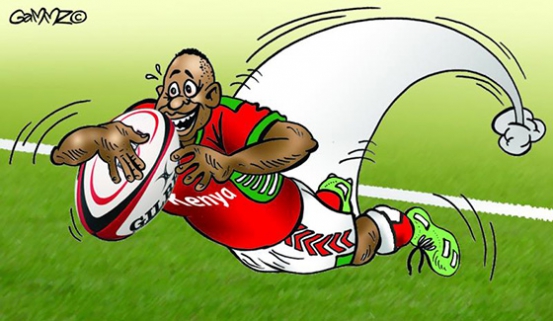
In November 2015, I was invited to give a talk to a corporate staff audience. A new head had been appointed and he was keen on inspiring his vision on teamwork. I racked my brain for an appropriate talk subject and settled on rugby. The one game that taught me trust, commitment and shared vision, the essential ingredients of team work.
Many people went to university for different reasons. Mine was unequivocally to play rugby. I wanted to play for University of Nairobi’s Mean Machine for it was a team that had left such a great impression on my mind. A university side that punched above its weight division and had produced some of Kenya’s greatest sevens players.
The year that I joined Machine, we lost virtually the entire team who had moved on after their final year. We were fresh faced rookies, full of enthusiasm but seriously untested. Our first big game was a true test of character. We went to play club side Nondies and got hammered 70-nil. A most humiliating experience. Girlfriends have left campus boys for less.
Our first season would be marked by successive losses, each match crashing our resolve. The fans wilted down to two loyal girlfriends and handful of ride or die buddies. The frustration started to get to us and divisions emerged. The backs often blamed the pack for not securing the ball. The pack players where I played insisted that the backs refused to do anything substantial with the hard fought ball.
Then in our second season, a coach appeared. His name was Absaloms “Bimbo” Mutere (RIP) a Machine veteran who was part of the inaugural Machine side in 1978. He instilled the Machine philosophy of collective responsibility. If a teammate was struggling, we would all struggle. He broke up the ranks and forced us to play in unfamiliar positions. We got to appreciate the reality of the back players as the running backs got a taste of the heat of the boiler room known as the pack.
When someone dropped a ball during practise, we all hit the ground for the best of 20. We started to do things together, all the time, on and off the pitch. Your team mate was the most important person in the match. They brought you glory and picked up after you. We became one large family. If you messed with one of us, you messed with all of us. The joke in Machine was that if a teammate got accosted we would all respond first and ask questions later.
Slowly, the team chemistry became self-evident, the results improved and the fans returned. 15 men playing as one unit. We were a well-oiled Machine and it was some of the best rugby I have ever played. We won several Sevens tournaments and earned our strips in Kenya’s rugby fraternity as exciting ball players. The experience at Machine changed me for life and my teammates remain friends to death. To date, I apply the same principles I learnt on the rugby pitch to my life.
World class individual talent
Coach Ham Onsando, the former Harlequins and Kenya’s Sevens coach in 1996, would share a similar story. During the inaugural Safari Sevens tournament, Kenya had assembled one of its finest sides ever. The individual talent was world class and included present Kenyan coach Benjamin Ayimba. Yet, when it mattered most, the magic failed to happen and the team under-performed.
Coach Ham was at loss, sulking in a corner of the bar wondering what he did wrong. He searched deep and realised that he needed to get the players to understand unity of purpose.
Shujaa main cup victory
He began to hold informal sessions after training teaching his players that the scattered emotions they carried onto the pitch affected their performance. During the game, there could only be one purpose and one team. These pep talks paid off and in the finals against UK’s Public School Wanderers, the Kenyan team walked onto the park with the same emotion. It was a sublime performance that saw Kenya lift its first Safari Sevens trophy in 1997.
19 years later, Ham would share these lessons in a powerful speech on rugby and life. How does rugby improve a player’s life?
The stock answers are mental development, physical stamina, character, blah,blah, blah. What is often not acknowledged is that rugby is training for life. It is an emotional roller coaster, and in 14 minutes, we experience pain, anguish, joy, pleasure, failure and triumph. Competitive sports are training grounds for life and as Ham Onsando eloquently put it, “Life is a spiritual journey and the pathways that we follow, are our emotions and rugby teaches us to walk the path of the strongest emotion of all, Love”.
Kenya’s Shujaa main cup victory at Singapore was more than just about a trophy. It was a tribute to the past generations of players who refused to quit and to the game that taught us to love life.
 The Standard Group Plc is a multi-media organization with investments in media
platforms spanning newspaper print
operations, television, radio broadcasting, digital and online services. The
Standard Group is recognized as a
leading multi-media house in Kenya with a key influence in matters of national and
international interest.
The Standard Group Plc is a multi-media organization with investments in media
platforms spanning newspaper print
operations, television, radio broadcasting, digital and online services. The
Standard Group is recognized as a
leading multi-media house in Kenya with a key influence in matters of national and
international interest.









